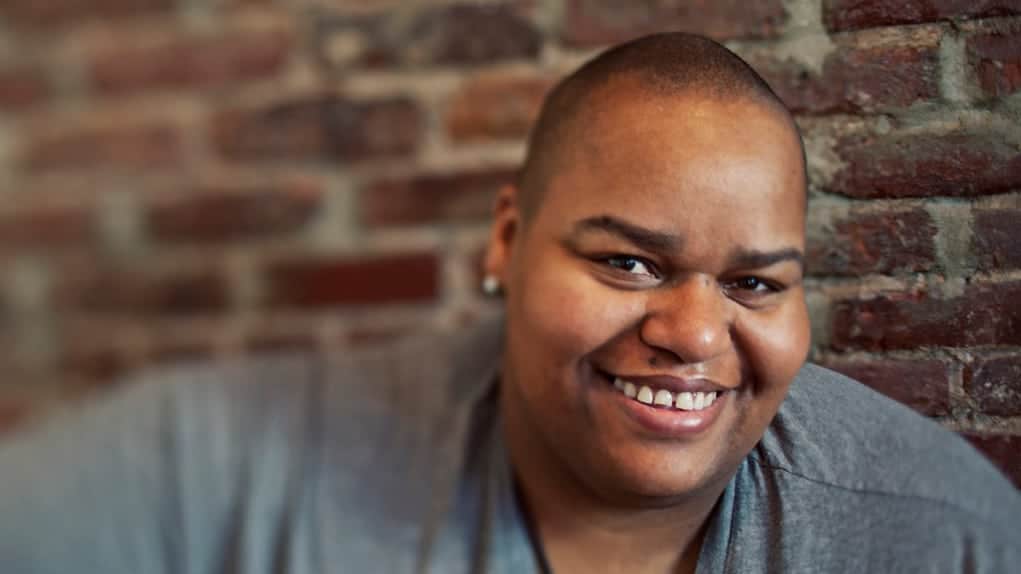A group of friends who have lost too much are sitting in the grass, muddy and exhausted after a long day. They are trying to cope with a world that has changed across the country without warning. They have found a place to stay, and right now they are trying to clean the house and plant some young trees. They have been running on adrenaline, trying to keep alive from one day to the next. The structures of the world around them are strained to breaking — health and schools, a stable economy, clean water — and it is happening fast.
Does this story sound familiar? In 1993 it was speculative fiction. Octavia Butler wrote The Parable of the Sower as a novel set in a world on the edge of collapse … and she set it in 2024. The internationally known musician and composer Toshi Reagon has written an opera based on the book, and she and her cast performed the music at Williams College. And this summer she has been livestreaming performances, as she says they feel more timely now than ever.
When she brought her music to town, I got to read the novel and spend an hour one afternoon talking with her about the book and the music, and a strong woman trying to imagine a new world.

Composer and musician Toshi Reagon presents 'The Parable of the Sower' based on Octavia Butler's novel at Williams College. Photo courtesy of Toshi Reagon
It comes back to me now, in this hard week. I know it’s a week much harder for many people than it is for me. And it leads me to think about what I love in the work I do.
I remember the drive and sadness and integrity in Toshi Reagon’s music, the way I remember the pulse of the night Che Malambo danced at Jacob’s Pillow, the percussive beat of their riding boots and the stir through the room when two men locked eyes and advanced out of the line to face each other, center stage, competing in rhythm with their shoulders wide and pride in the set of their bodies. The energy running through their mock battle was laughing, exhilarated, and it brought the whole room to their feet.
This is the world I want to live in. I want to live in a world where people can hold each other, and walk freely, and speak without fear. I want to live in a world where people can live with passion and laughter. I want to live in a world where people value the balance of living systems that keep us alive.
Butler writes, “Seed to tree, tree to forest, rain to river, river to sea …The universe is God’s self-portrait.” She is talking about change. But she is also talking about an ecosystem that generates and sustains itself.
Parable of the Sower is about a woman who sets out to build a new way for a group of people to live together in the world, and care for the world and each other.
I remember the night I heard Toshi Reagon’s music. In her opera a close community is holding onto each other in a fraying world. A father is trying to protect his family. There are no jobs — so he has he brought his neighbors together and encouraged them to plant gardens, and to keep an eye on each other’s children, and some who can are teaching classes in their living rooms.
Their companionship and their leader give them strength. And now his daughter, barely 20, is lifting her voice. She is warning him that their unity can also put them at risk, because they have things other people didn’t have. They have fruit trees and books and family. They have food and shelter.
Lauren Olamina tells the story, and she will have to make hard choices to survive. Imagine her walking north up an empty highway that has become a path for people who have lost their homes. Imagine her holding together a few companions. Imagine that water is scarce. Refilling a plastic bottle at a gas station can be deadly.
But some people earn her trust. Here is an educated man, strong and no longer young. He struggles with what he has lost, and his voice is a resonant bass. Two sisters are traveling together in the desert at night, harmonizing with a high, clear Appalachian loneliness and protecting each other. And Toshi Reagon herself is singing low over acoustic guitar, with a rhythm out of the 1960s, to a family whose daughter wants to move to a company town to work in the factories.
I remember Lauren’s courage and the determination that carries her and her chosen family through when they are on the edge of dissolving. And the need that drives them comes through sharp and clear. They want to feel safe. They want a place where they can live and work and sit in the garden at the end of the day.
They have lost their families and loved ones for no reason, and the social structures that should have existed to keep them safe have failed. That sadness, that relentless question rises in the music — where can we live
Their strength moves me. My life is infinitely richer because I can walk into the ’62 Center and hear music like this, free, and listen to these stories. Lauren travels north with her companions, into the hills, looking for a place where they feel safe to root themselves … and if she were traveling up the east coast instead of the west, I want to live in a world where they might consider stopping here.

